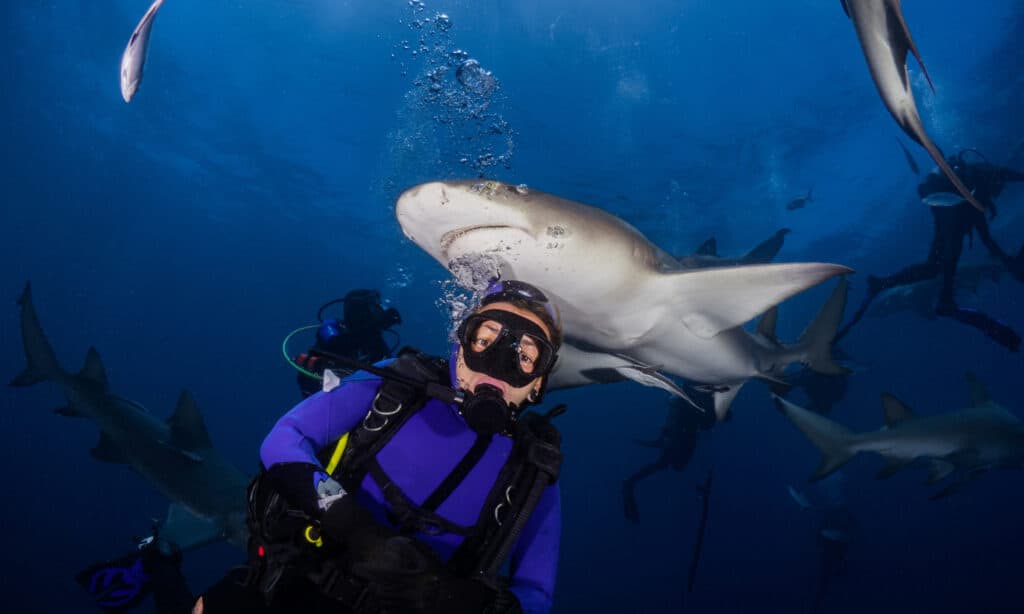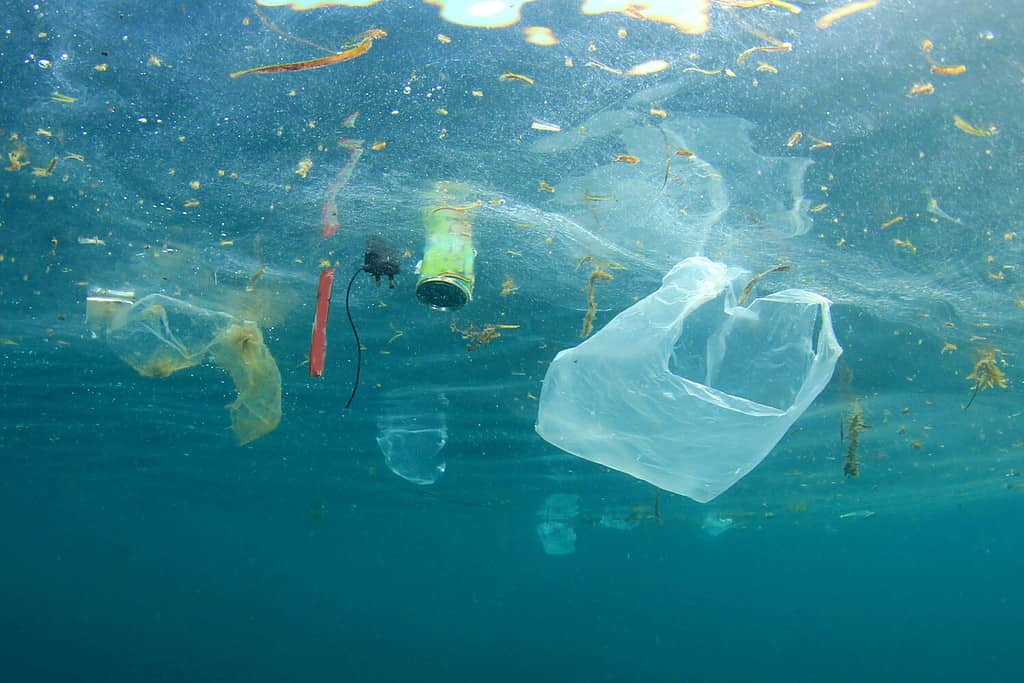Even if you don’t step foot into the water, your health is directly impacted by the health of the ocean. And the ocean’s health relies on the presence of sharks. Discover the five best ways to protect sharks! (Some are simple, and some are a bit more … immersive.)
The 5 Best Ways to Protect Sharks
1. Swim With Sharks

When you swim with sharks, you realize being in their presence is a privilege. Your perspective broadens and you recognize their inherent importance.
©Mike Workman/Shutterstock.com
Do what, exactly?! While we realize this #1 way to protect sharks may come as a surprise, when you understand why, it makes sense. It’s certainly not for everyone but for those looking for a way to help protect sharks and learn in an immersive environment, swimming with sharks is a fantastic choice.
Shark Expert Weighs In
Carmen Koepfer, Marine Biologist and Shark Specialist, told A-Z-Animals, “Why swimming with sharks can help? Raising awareness about the global issues facing sharks is crucial. Once a shark is caught, its meat is sold at a very low price, often around one dollar per kilogram. This low value is due to the high concentrations of heavy metals such as mercury, arsenic, lead, and cadmium in shark meat, making it toxic for consumption and posing health risks to any organism.”
While the experience of swimming with sharks is one-of-a-kind and thrilling, the main way swimming with sharks helps is because it leads to further conversation on the topic. Those who don’t know about sharks don’t talk about them. Consequently, those who don’t swim with sharks don’t learn about how they function in their natural environment. Those who don’t learn about sharks don’t recognize the integral role they play in the marine ecosystem.
Koepfer, steadfast in her quest to educate, shares, “The vulnerability of sharks to overfishing is multifaceted, involving their slow reproductive rate, targeted fishing during reproductive events, and the environmental consequences of industrial fishing practices. Raising awareness and taking action to protect sharks are essential for the health of the marine ecosystem and, consequently, our own well-being.”
2. Eliminate Plastic Use

You can make a big impact by making small shifts in your day-to-day activities.
©Rich Carey/Shutterstock.com
Whatever your beverage choice each day, consider what type of bottle you’re using. Reduce your use of single-use plastic by opting for a refillable bottle or thermos. You can make a difference by being more conscientious and proactive in your local community. While volunteering efforts may not be possible for every schedule, just picking up litter as you walk through your neighborhood or downtown can positively impact the environment. When shopping, skip the plastic bags. Invest in reusable bags you can keep in your trunk for all your shopping needs! These steps are simple and require little work. But they are game-changing efforts that protect marine wildlife.
Shark Expert Weighs In
Koepfer helped to put things into perspective when she explained, “The ocean’s well-being is crucial for our survival, not only because it provides a source of food and numerous ecosystem services but also because over 75% of the oxygen we breathe comes from the sea. Phytoplankton in the ocean undergoes photosynthesis, producing oxygen, much like plants. Therefore, if the ocean becomes unhealthy, we face a threat to our oxygen supply. Regardless of dietary choices or environmental concerns, the health of the ocean should matter to everyone, as it is interconnected with the well-being of the planet.”
According to the National Institute of Environmental Health Sciences (NIH), your personal health is directly impacted by the health of the ocean. Pollution is a global issue that affects ecosystem health. The repercussions are far-reaching and complex, and researchers are working toward getting the word out that the ocean’s well-being is of critical importance to the well-being of human populations throughout the earth. While plastic waste is a major issue, it’s truly just the tip of the iceberg. In addition to plastic waste, the ocean is unjustly facing threats from pesticides, oil spills, mercury, and manufactured chemicals.
3. Mind Your Cosmetics

Be mindful when selecting your skincare products to ensure your beauty efforts aren’t costing sharks their lives.
©Sofia Zhuravetc/Shutterstock.com
Check the ingredients of your cosmetics and scrutinize any product that lists squalene as an ingredient. The majority of squalene is derived from shark liver oil, and it’s included in a range of cosmetic products, ranging from makeup formulations to lotions and serums. It’s marketed as a potent emollient that helps users smooth and moisturize their skin. What they don’t tell you is they often target sharks that live in the deeper regions of the ocean, as they are the ones that tend to have higher concentrations of oil in their livers.
Consider the life cycle of a shark. Their reproduction rates are slow. Much slower than the production rates of cosmetics. Sharks are continually killed in the name of smoother skin and beautifying products like lip gloss. This is especially egregious considering there are alternatives to squalene from shark liver! When selecting your cosmetics, look for products that state “100% plant-derived.”
4. Take a Gander at Shark Laws

Although shark laws are in place, loopholes exist.
©Andreas Altenburger/iStock via Getty Images
Laws have loopholes and it’s no different when it comes to shark laws. For example, in the U.S., shark finning is illegal. Plain and simple, right? Not exactly. The U.S. still exports and imports shark fins. There are only 13 out of 50 states that are explicit in their verbiage about the shark fin trade. On the other hand, at least 10 states have restaurants where shark fin soup continues to be a printed item on the menu. When shark fin transgressions are legally pursued, the sentences are rather lenient with some fines totaling less than a thousand dollars.
Shark Expert Weighs In
Koepfer explains, “There is a cascading effect in play here: the health of the ecosystem relies on the presence of sharks. Currently, there is a growing awareness of the fact that around 100 million sharks are caught annually, and these figures are from five years ago. The consumption of shark fins is a significant problem, driven mainly by industrial fishing practices that use large nets and hooks covering extensive areas in the sea. Sharks are particularly vulnerable to this type of fishing due to their slow reproductive rate. Sharks can take up to 15 years to reach reproductive maturity, and they produce few offspring that also take a long time to grow.”
Koepfer, who offers courses on shark protection and diving, further explained that “Sharks, despite having existed since before the dinosaurs and being older than trees, are highly sensitive to overfishing. In recent years, from 1970 to 2010, there was already a recorded disappearance of 50 to 90% of shark populations. By 2016, there was a decline of over 85% in shark populations worldwide. This vulnerability is directly linked to our survival, as the health of the marine ecosystem, on which our existence depends, is connected to the presence of sharks.”
5. Make Well-Informed Seafood Choices

Marine biologists help the seafood industry provide consumers with sustainable food choices.
©Agave Photo Studio/Shutterstock.com
Koepfer highlighted the interconnectedness of not just your practices, but also your choices as she explained the following: “Industrial fishing, especially the use of enormous nets and longlines, poses a severe threat to shark populations. The bycatch, where sharks are unintentionally caught in these nets and hooks, contributes significantly to their decline. The slow reproductive strategy of sharks makes them highly susceptible to overfishing, as it doesn’t give their populations enough time to recover. Moreover, targeting sharks during their reproductive aggregations further exacerbates the problem.”
Even if seafood isn’t on your menu, it’s crucial you understand that many populations throughout the world rely on fish populations to support their economies. The vibrancy of marine ecosystems is supported by the presence of sharks and without them, entire ecosystems collapse. Some types of fishing, like industrial fishing, result in bycatching. But what can you do about that? Here are some options:
- Look into which fisheries operate sustainably.
- Call ahead before visiting restaurants to inquire about their sustainability efforts.
- Use tools like the Monterey Bay Aquarium’s Seafood Watch, which helps you make these well-informed choices that protect our sharks.
The photo featured at the top of this post is © iStock.com/abadonian
Thank you for reading! Have some feedback for us? Contact the AZ Animals editorial team.






